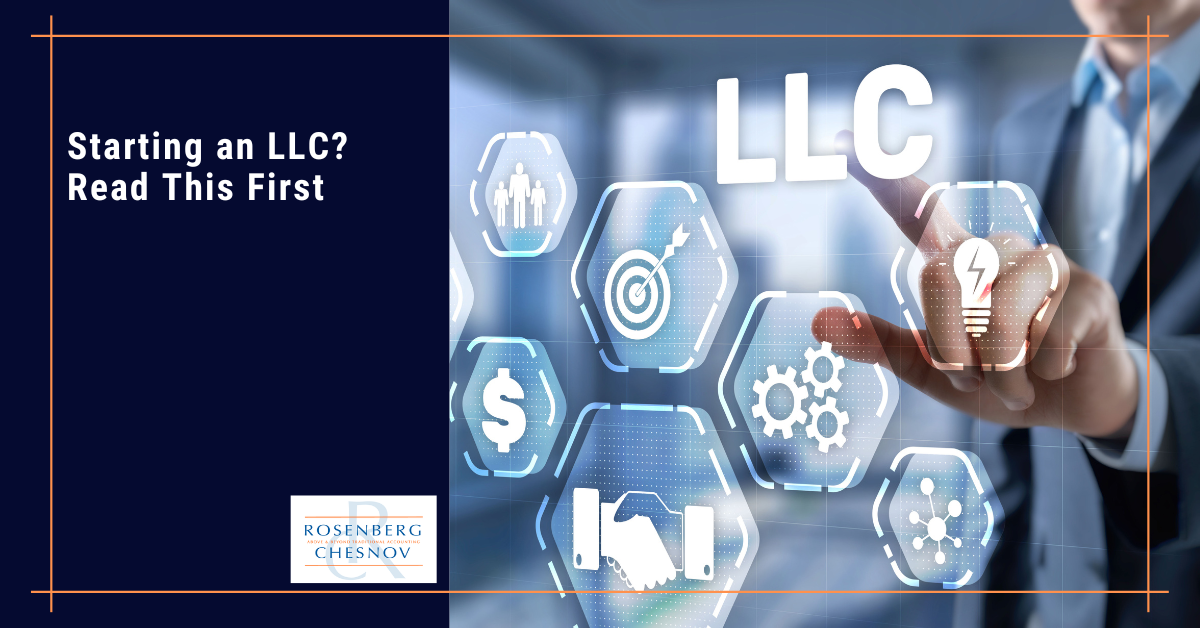

Maximize Your 2024 Refund: Tax Breaks You Might Be Missing
Category: Accounting
Why form an LLC?
For plenty of entrepreneurs who wish to start their own business, one of the first questions they ask themselves is: What form of business entity is best for their needs?
With plenty of options to choose from, and with your decision impacting everything from how you operate your business, to the taxes you pay, to the assets you put at risk, choosing the proper business structure may be the most critical decision you’ll make while building your company.
An LLC, or limited liability company, offers plenty of advantages for business owners who wish to limit their personal liability while maintaining versatility and taxation options. However, there are also disadvantages you’ll need to weigh, and if an LLC is not the right fit for your business goals, this type of structure could end up holding you back. Additionally, an LLC can be tricky to set up, even if it is the best fit.
Let’s dive into the details below to understand why an LLC may or may not be the right choice for your business and to discover how to get started forming one.


An LLC is a typical business entity structure organized under U.S. state law. The essential advantage of an LLC is that it provides all its members with limited personal liability for its debts. This kind of protection is usually only available to corporations, combined with the simplicity and flow-through taxation one would generally find in a sole proprietorship or partnership.
What does that mean? LLCs could be considered hybrid entities — they provide the same protections as a corporation, but they can be simpler than corporations to operate and maintain.
Additionally, an LLC allows profits to be passed directly to investors, to be taxed as part of their personal income, thus avoiding the “double taxation” incurred by corporations, which incur taxation on both the corporate and individual levels.
One more point worth noting: depending on elections made and the number of owners, an LLC may be classified for federal income tax purposes as a partnership, corporation, or entity disregarded as separate from its owner.
The primary reason to start an LLC is to protect your personal assets, meaning creditors cannot claim your personal accounts, property, cash, or cash equivalents to satisfy a company’s debt. This can be particularly helpful for businesses with potential liability in operations, businesses requiring equity capital, or businesses expecting ownership changes over time.
An LLC may be the right choice for most people starting a new small business, and most people currently operating a small business as a sole proprietorship may also want to consider forming an LLC. After all, you can use this type of structure for almost any business in nearly every industry!
Another reason to start an LLC is to lower your tax liability. You can also use an LLC to give yourself some extra credibility and make it easier to get financing or a business loan.
As we touched upon above, asset protection is one of the most attractive qualities of an LLC. (One caveat: an LLC will not protect you from malpractice liability, meaning it will not protect you from your negligence.)
We have also mentioned that flow-through taxation can lower your tax bill. Other pros of using an LLC to structure your business include:
Additionally, an LLC is flexible; you can use the LLC structure in almost any industry to get the benefits of a corporation without the complicated tax rules.
However, there are also disadvantages you will need to consider. For example:
Furthermore, LLCs can be complex to set up, and you will have to report business income and expenses on your personal tax return, which can be time-consuming.
In certain states, some types of businesses are also ineligible to be formed as LLCs. Additionally, with some states generally limiting the practice of a single LLC to one profession (with some exceptions), entrepreneurs forming LLCs may find themselves limited in professional collaboration.
Having said that, the pros of an LLC tend to outweigh the cons for many aspiring business owners assessing their business entity options.
The first step in starting an LLC is to choose a business name! Remember, to be a legal entity, your business must have a unique name, different from any existing LLC in your state. What’s more, your business name must indicate that the company is an LLC, and it must not include words restricted by your state.
Once you have chosen the perfect name, the next step is to file your articles of incorporation — a document that you file with your Secretary of State, which makes your LLC a legal entity. This document should include your business name, address, members’ names, and resident agent. There is usually a filing fee, although it can be comparatively affordable in many states.
Next, create an operating agreement. Most states do not require an operating agreement to form an LLC, but we strongly recommend making one, especially for multi-member organizations. The operating agreement structures your LLC’s finances and organization and provides rules and regulations for its operation.
Sometimes tax treatment can be dictated by a written operating agreement. For example, multi-member LLCs default tax rules will split income and expenses evenly unless otherwise noted in an operating agreement.
If your operating agreement requires an annual member meeting, make sure you hold and document such meetings. Failure to do so, or to adhere to any other provisions in the operating agreement, could result in loss of liability protection for your LLC.
Lastly, apply for an EIN (employer identification number). This nine-digit number, assigned by the IRS, identifies the tax accounts of employers and certain others who do not have employees. If you hire employees or have an LLC with multiple embers, you must apply for an EIN.
To get started, consult IRS Form SS-4, Application for Employer Identification Number, or apply online at www.irs.gov.
In considering the business entity that best suits your needs, be sure to weigh the type of business you have and whether or not an LLC makes sense for your industry. For example, tech startups who plan to follow the traditional path of equity grants, financing, and reinvestment would likely not want to organize as an LLC.
It is also essential to consider the amount of risk you take in operating your business and whether the specific liability protections of an LLC will provide you with the best shield. For some risk profiles, a corporation may be the better choice.
If you are risk-averse, and especially if your company is not yet profitable or you want to reinvest the profits back into the business, an LLC may be more trouble than it’s worth.
Finally, you should also think about your future goals for the business. For example, if you hope one day to sell the business to a big company in exchange for cash and/or stock, an LLC would likely be the wrong choice for you.
If you are a client and would like to book a consultation, call us at +1 (212) 382-3939 or contact us here to set up a time.
If you aren’t a client, why not? We can take care of your accounting, bookkeeping, tax, and CFO needs so that you don’t have to worry about any of them. Interested? Contact us here to set up a no-obligation consultation.
Interested in receiving updates in your mailbox? Check out our newsletter, full of information you can use. It comes out once every two weeks, and you can register for it below.
Why form an LLC?
For plenty of entrepreneurs who wish to start their own business, one of the first questions they ask themselves is: What form of business entity is best for their needs?
With plenty of options to choose from, and with your decision impacting everything from how you operate your business, to the taxes you pay, to the assets you put at risk, choosing the proper business structure may be the most critical decision you’ll make while building your company.
An LLC, or limited liability company, offers plenty of advantages for business owners who wish to limit their personal liability while maintaining versatility and taxation options. However, there are also disadvantages you’ll need to weigh, and if an LLC is not the right fit for your business goals, this type of structure could end up holding you back. Additionally, an LLC can be tricky to set up, even if it is the best fit.
Let’s dive into the details below to understand why an LLC may or may not be the right choice for your business and to discover how to get started forming one.
An LLC is a typical business entity structure organized under U.S. state law. The essential advantage of an LLC is that it provides all its members with limited personal liability for its debts. This kind of protection is usually only available to corporations, combined with the simplicity and flow-through taxation one would generally find in a sole proprietorship or partnership.
What does that mean? LLCs could be considered hybrid entities — they provide the same protections as a corporation, but they can be simpler than corporations to operate and maintain.
Additionally, an LLC allows profits to be passed directly to investors, to be taxed as part of their personal income, thus avoiding the “double taxation” incurred by corporations, which incur taxation on both the corporate and individual levels.
One more point worth noting: depending on elections made and the number of owners, an LLC may be classified for federal income tax purposes as a partnership, corporation, or entity disregarded as separate from its owner.
The primary reason to start an LLC is to protect your personal assets, meaning creditors cannot claim your personal accounts, property, cash, or cash equivalents to satisfy a company’s debt. This can be particularly helpful for businesses with potential liability in operations, businesses requiring equity capital, or businesses expecting ownership changes over time.
An LLC may be the right choice for most people starting a new small business, and most people currently operating a small business as a sole proprietorship may also want to consider forming an LLC. After all, you can use this type of structure for almost any business in nearly every industry!
Another reason to start an LLC is to lower your tax liability. You can also use an LLC to give yourself some extra credibility and make it easier to get financing or a business loan.
As we touched upon above, asset protection is one of the most attractive qualities of an LLC. (One caveat: an LLC will not protect you from malpractice liability, meaning it will not protect you from your negligence.)
We have also mentioned that flow-through taxation can lower your tax bill. Other pros of using an LLC to structure your business include:
Additionally, an LLC is flexible; you can use the LLC structure in almost any industry to get the benefits of a corporation without the complicated tax rules.
However, there are also disadvantages you will need to consider. For example:
Furthermore, LLCs can be complex to set up, and you will have to report business income and expenses on your personal tax return, which can be time-consuming.
In certain states, some types of businesses are also ineligible to be formed as LLCs. Additionally, with some states generally limiting the practice of a single LLC to one profession (with some exceptions), entrepreneurs forming LLCs may find themselves limited in professional collaboration.
Having said that, the pros of an LLC tend to outweigh the cons for many aspiring business owners assessing their business entity options.
The first step in starting an LLC is to choose a business name! Remember, to be a legal entity, your business must have a unique name, different from any existing LLC in your state. What’s more, your business name must indicate that the company is an LLC, and it must not include words restricted by your state.
Once you have chosen the perfect name, the next step is to file your articles of incorporation — a document that you file with your Secretary of State, which makes your LLC a legal entity. This document should include your business name, address, members’ names, and resident agent. There is usually a filing fee, although it can be comparatively affordable in many states.
Next, create an operating agreement. Most states do not require an operating agreement to form an LLC, but we strongly recommend making one, especially for multi-member organizations. The operating agreement structures your LLC’s finances and organization and provides rules and regulations for its operation.
Sometimes tax treatment can be dictated by a written operating agreement. For example, multi-member LLCs default tax rules will split income and expenses evenly unless otherwise noted in an operating agreement.
If your operating agreement requires an annual member meeting, make sure you hold and document such meetings. Failure to do so, or to adhere to any other provisions in the operating agreement, could result in loss of liability protection for your LLC.
Lastly, apply for an EIN (employer identification number). This nine-digit number, assigned by the IRS, identifies the tax accounts of employers and certain others who do not have employees. If you hire employees or have an LLC with multiple embers, you must apply for an EIN.
To get started, consult IRS Form SS-4, Application for Employer Identification Number, or apply online at www.irs.gov.
In considering the business entity that best suits your needs, be sure to weigh the type of business you have and whether or not an LLC makes sense for your industry. For example, tech startups who plan to follow the traditional path of equity grants, financing, and reinvestment would likely not want to organize as an LLC.
It is also essential to consider the amount of risk you take in operating your business and whether the specific liability protections of an LLC will provide you with the best shield. For some risk profiles, a corporation may be the better choice.
If you are risk-averse, and especially if your company is not yet profitable or you want to reinvest the profits back into the business, an LLC may be more trouble than it’s worth.
Finally, you should also think about your future goals for the business. For example, if you hope one day to sell the business to a big company in exchange for cash and/or stock, an LLC would likely be the wrong choice for you.
If you are a client and would like to book a consultation, call us at +1 (212) 382-3939 or contact us here to set up a time.
If you aren’t a client, why not? We can take care of your accounting, bookkeeping, tax, and CFO needs so that you don’t have to worry about any of them. Interested? Contact us here to set up a no-obligation consultation.
Interested in receiving updates in your mailbox? Check out our newsletter, full of information you can use. It comes out once every two weeks, and you can register for it below.
Found this article helpful? Share it with your network.
Facebook
Twitter
LinkedIn
Email



Above & Beyond
Traditional Accounting
Phone: 212-382-3939
New York City
2 West 45th Street, Suite 1208
New York, New York 10036
Westchester
565 Taxter Road,
Suite 105,
Elmsford, New York 10523
© 2021 All rights reserved


Category: Accounting


Category: Accounting


Category: Accounting
Send us a message and we will contact you as soon as possible.
Jeff Coyle, CPA, Partner of Rosenberg Chesnov, has been with the firm since 2015. He joined the firm after 20 years of business and accounting experience where he learned the value of accurate reporting, using financial information as a basis for good business decisions and the importance of accounting for management.
He is a diligent financial professional, able to manage the details and turn them into relevant business leading information. He has a strong financial background in construction, technology, consulting services and risk management. He also knows what it takes to create organizations having built teams, grown companies and designed processes for financial analysis and reporting.
His business experience includes:
Creating and preparing financial reporting, budgeting and forecasting.
Planning and preparation of GAAP and other basis financial statements.
Providing insight on financial results and providing advice based on those results.
Jeff also has a long history of helping individuals manage their taxes and plan their finances including:
Income tax planning and strategy.
Filing quarterly and annual taxes.
Audit support.
General financial and planning advice.
Prior to joining the firm in 2015, Jeff was in the private sector where he held senior financial and management positions including Controller and Chief Financial Officer. He has experience across industries, including construction, technology and professional services which gives him a deep understanding of business.
Jeff graduated from Montclair State University, he is a CPA and member of the American Institute of Certified Public Accountants, New York State Society of Certified Public Accountants and New Jersey State Society of Public Accountants.
Jody H. Chesnov, CPA, Managing Partner of Rosenberg Chesnov, has been with the firm since 2004. After a career of public accounting and general management, Jody knows the value of good financials. Clarity, decision making, and strategy all start with the facts – Jody has been revealing the facts and turning them into good business results for more than three decades.
He takes a pragmatic approach to accounting, finance and business. His work has supported many companies on their path to growth, including helping them find investors, manage scaling and overcome hurdles. His experience and passion for business reach beyond accounting and he helps businesses focus on what the numbers mean organizationally, operationally and financially.
He has a particular expertise in early-stage growth companies. His strengths lie in cutting through the noise to come up with useful, out of the box, solutions that support clients in building their businesses and realizing their larger visions.
Prior to joining the firm in 2004, Jody was in the private sector where he held senior financial and management positions including General Manager, Chief Financial Officer and Controller. He has experience across industries, which gives him a deep understanding of business.
Jody graduated with a BBA in Accounting from Baruch College, he is a CPA and member of the American Institute of Certified Public Accountants and New York State Society of Certified Public Accountants.
In addition to delivering above and beyond accounting results, Jody is a member of the NYSCPA’s Emerging Tech Entrepreneurial Committee (ETEC), Private Equity and Venture Capital Committee and Family Office Committee.
He is an angel investor through the Westchester Angels, and has served as an advisor for many startup companies and as a mentor through the Founders Institute.